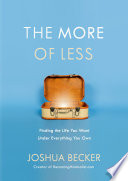

The core premise of 'The More of Less' is the minimalist lifestyle, which advocates for owning fewer possessions to enhance one's life quality. The author, Joshua Becker, emphasizes that minimalism is not just about decluttering physical spaces but also about decluttering mental and emotional spaces. By reducing the number of physical items we own, we can create a more serene environment that fosters clarity, focus, and peace. Becker illustrates how the distractions of excess belongings can hinder personal growth and relationships, making a compelling case for the psychological benefits of minimalism. The book discusses practical steps to begin this journey, such as evaluating the necessity of items, finding joy in experiences rather than possessions, and understanding that minimalism is a personal journey that can vary greatly from one individual to another.
Continue readingBecker challenges readers to rethink the purpose of their possessions. He argues that many people accumulate items out of habit or societal pressure rather than genuine need or desire. This idea encourages self-reflection on what truly brings joy and value to one’s life. Becker introduces the concept of 'life-giving' possessions—those items that enhance our lives and contribute to our happiness and well-being. By identifying and prioritizing these possessions, individuals can let go of the clutter that weighs them down. This process not only simplifies physical space but also clarifies personal values and priorities, leading to a more intentional and fulfilling life.
Continue readingOne of the most profound ideas presented in the book is the freedom that comes from owning less. Becker discusses how the burden of excessive belongings can lead to stress, anxiety, and a feeling of being overwhelmed. By choosing to live with less, individuals can experience a newfound sense of freedom—freedom from debt, maintenance, and the constant need to acquire more. This freedom allows people to focus on what truly matters, such as relationships, experiences, and personal growth. Becker shares personal anecdotes and stories from others who have embraced minimalism, illustrating how this lifestyle change has led to greater happiness and fulfillment.
Continue readingIntentional living is a recurring theme in 'The More of Less.' Becker encourages readers to make conscious choices about how they spend their time, money, and energy. This involves setting priorities and aligning daily actions with personal values. Minimalism serves as a tool for intentional living, as it helps eliminate distractions and allows individuals to focus on what is truly important to them. The book offers strategies for creating an intentional life, such as setting goals, practicing gratitude, and regularly reassessing one’s commitments and possessions. By living intentionally, individuals can cultivate a life that reflects their true selves and aspirations.
Continue readingBecker addresses the pervasive influence of consumer culture and its impact on individual happiness. He critiques the societal narrative that equates success and fulfillment with material wealth and possessions. This critique serves as a wake-up call for readers to recognize the emptiness that often accompanies the pursuit of material goods. The book encourages a shift in mindset—from viewing possessions as a source of identity and self-worth to seeing them as tools that should serve a purpose in enhancing life. By understanding the detrimental effects of consumerism, readers are empowered to break free from societal expectations and define success on their own terms.
Continue readingIn 'The More of Less,' Becker emphasizes the importance of community and connection in the minimalist journey. He posits that relationships are far more valuable than material possessions and that fostering meaningful connections can lead to greater happiness. The book encourages readers to invest time and energy in building relationships rather than accumulating things. Becker shares examples of how minimalism can create space for deeper connections with family, friends, and the community. By prioritizing relationships over possessions, individuals can experience a richer, more fulfilling life.
Continue readingThe final key idea in the book is the relationship between minimalism and sustainability. Becker discusses how owning less not only benefits individuals but also has a positive impact on the environment. By reducing consumption, individuals can contribute to a more sustainable world. The book highlights the importance of making mindful choices about purchases and considering the environmental consequences of consumer habits. Becker encourages readers to embrace a lifestyle that values sustainability, promoting a sense of responsibility towards the planet and future generations.
Continue readingThe reading time for The More of Less depends on the reader's pace. However, this concise book summary covers the 7 key ideas from The More of Less, allowing you to quickly understand the main concepts, insights, and practical applications in around 19 min.
The More of Less is definitely worth reading. The book covers essential topics including The Minimalist Lifestyle, The Purpose of Possessions, The Freedom of Less, providing practical insights and actionable advice. Whether you read the full book or our concise summary, The More of Less delivers valuable knowledge that can help you improve your understanding and apply these concepts in your personal or professional life.
The More of Less was written by Joshua Becker.
If you enjoyed The More of Less by Joshua Becker and want to explore similar topics or deepen your understanding, we highly recommend these related book summaries:
These books cover related themes, complementary concepts, and will help you build upon the knowledge gained from The More of Less. Each of these summaries provides concise insights that can further enhance your understanding and practical application of the ideas presented in The More of Less.